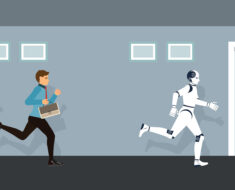War, the macabre ballet of destruction, has always danced to the choreography of human folly. But on the horizon, a new conductor approaches, its baton a complex code, its orchestra an army of silicon and steel. Artificial intelligence, the algorithmic Prometheus, brings fire to the battlefield, and with it, a Pandora’s box of implications.
On the one hand, AI promises surgical precision, cold logic replacing the passion-clouded judgment of men. Autonomous drones, guided by unblinking circuits, could target enemy combatants with pin-point accuracy, minimizing civilian casualties. Logistics become hyper-efficient, supply chains optimized by algorithms humming in the background. AI can even analyze enemy movements, predicting attacks and outmaneuvering opponents in a chess game of algorithms.
But war is not merely an equation to be solved. It is a human tragedy, a tapestry woven with blood, fear, and the heartbreak of loss. Algorithms can’t comprehend the moral murk of the battlefield, the slippery slope where “acceptable collateral damage” becomes a sanitized euphemism for innocent lives. Can a machine truly distinguish between an insurgent and a fleeing farmer? Will AI, trained on historical data rife with human bias, perpetuate discrimination and injustice on the bloodied canvas of war?
Moreover, the delegation of lethal power to machines, the ceding of our collective will to the cold logic of code, sets a dangerous precedent. Who owns the responsibility when an AI-powered weapon makes a fatal error? Can we truly hold an algorithm accountable, or will we become puppets in a play directed by our own creations?
The specter of autonomous arms races looms, nations locked in a technological dance macabre, each iteration of AI weaponry more lethal than the last. Imagine an arms race of algorithms, machines pitted against machines in a self-fulfilling prophecy of destruction, a war without human fingerprints but with humanity’s annihilation as the prize.
Yet, AI isn’t just a harbinger of doom. It can also be a force for peace. Imagine AI-powered surveillance systems monitoring ceasefires, detecting violations, and pre-empting escalation. Think of AI translating languages in real-time, fostering communication and understanding between warring factions. Envision AI algorithms analyzing and mediating complex political disputes, seeking common ground where human emotions once fueled conflict.
The choice is ours, not AI’s. We must harness the power of algorithms with wisdom, not fear. We must ensure human oversight, not abdication. We must remember that war is not merely a technical problem, but a human one, with solutions demanding empathy, compassion, and a fierce commitment to peace. As we walk the tightrope between progress and peril, let us not forget that the ultimate weapon against war is not an algorithm, but a beating human heart, tempered by wisdom and driven by the unyielding hope for a better tomorrow.
The battlefield of the future awaits. Will we be remembered as the architects of our own digital Götterdämmerung, or as the wise shepherds who guided AI towards a brighter dawn? The code is not yet written, the algorithm sleeps. It is in our hands to awaken it with purpose, not with a trigger.




